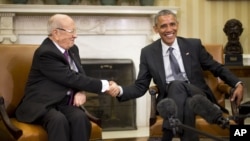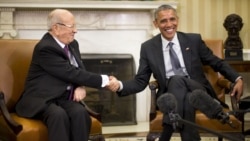The first democratically elected president of Tunisia since the revolution of 2011, Beji Caid Essebsi, visited Washington recently along with members of his cabinet and Tunisia’s parliament, and met with senior U.S. officials, including President Barack Obama, Vice President Joe Biden, and the Secretaries of Commerce, Defense, Treasury, and State.
The visit highlights the importance of U.S.-Tunisia relations, as Tunisia continues its journey of democratic transformation, which, since 2011, has included a revolution ousting a long-term dictator, multiple free and fair elections, and the crafting of a new constitution, rooted in the rule of law and recognition of the human rights of all people, including women and minorities.
Secretary of State John Kerry noted that what has occurred in Tunisia in the last four years sends the world an important message: “that democratic institutions, while sometimes difficult in the transition…can succeed when they have courageous leadership and when they have compromise.”
On May 20, with President Caid Essebsi in attendance, Secretary Kerry and Tunisian Minister Advisor for Political Affairs Mohsen Marzouk signed a Memorandum of Understanding between the United States and Tunisia, spelling out the wide range of bilateral cooperation and programs, including economic development, security, and people-to-people ties.
Secretary Kerry said the memorandum makes clear U.S. support for Tunisia’s democratic transition and will “bolster a country leadership team that has really been steadfast in its support of Tunisia’s remarkable democratic progress.”
On May 21, President Obama and President Caid Essebsi released a joint opinion piece in the Washington Post newspaper. In it, the two leaders said that “Tunisia shows that democracy is not only possible, but also necessary in North Africa and the Middle East,” proving “that democracy and Islam can thrive together.”
They noted that since 2011, the United States has committed nearly $700 million and supported two major loan guarantees to help Tunisians pursue critical political, economic, and security reforms.
“After decades of dictatorship and several years of transition,” wrote Presidents Obama and Caid Essebsi, “Tunisians have won their freedom and democracy.” The road ahead will not be easy, the two leaders warned. “But as Tunisians seek to build the Arab world’s newest democracy, they will continue to have a strong friend and partner in the world’s oldest democracy, the United States of America.”






